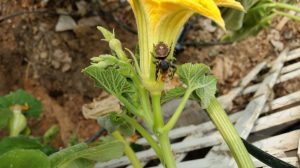I admit to an irrational fear of spiders. Our movies and media have exploited their scary look, casting them as villains. But spiders are beneficial, eating flies, mosquitos, moths and so many other harmfuls! So, I try my best to let them be, encouraging others to do the same. (Unless they land on me unexpectedly, then I’m afraid I’ve smashed them while dancing around and yelling. So sorry.)
There are so many varieties of bugs – insects and arachnids (spiders) – that it’s important we know something about them before waging war on them. Some we delight in; ladybugs, for instance. Who doesn’t like ladybugs and for good reason? Not only are they cute, but their appetite for aphids puts them high on my list of favorites. Watching a big hatch in the spring is pretty awe inspiring.
How about the less popular species? Those springtime web caterpillars dangling from our oak trees are destructive insects, but a major food source for baby hummingbirds! Their parents harvest the caterpillars and bring this source of protein to their babies. Several friends are terrified of honey bees. Most of us are aware, however, that without bees many of our food crops would not be pollinated. Hand-pollinating plants is very tedious! Wasps can also be beneficial (though I have to admit, I do not go out of my way to protect them!).
Other insects can be destructive. Tomato hornworms are voracious on your tomato plants and, for years, I gathered them to feed my chickens. But it turns out they become sphinx moths pollinating specific plants we would lose without them. Now I grow a sacrificial cherry tomato plant each year and transfer the tomato hornworms there to let them live.
Cockroaches? I can think of no reason not to squash them. Aphids as well, multiplying so fast they’ll wipe out an entire crop of broccoli or squash plants. Cabbage moths? Sorry, I have nothing nice to say about these prolific eaters. I hunt them and squish them or drop them in soapy water.
One of my favorite predators is the praying mantis. They are fascinating to watch and protect my garden from pests. However, they’ll eat practically any insect—beneficial as well as their own kind.
A couple of odd critters deserve a mention. Jerusalem crickets, otherwise known as potato bugs, are weird looking with big heads and brown bodies. They’re usually found under bricks and rocks. The name “cricket” implies harm, but for the most part, they’re harmless and can be beneficial, eating other bugs. They will damage potatoes, however; if that’s the issue, have at it. Lastly, earwigs with scary pinchers on their rears. They’re harmful to tender seedlings, but they also can be beneficial. And the way they nurture their eggs and young over the winter is amazing.
Our movies and media have made many bugs seem frightening, but these creatures deserve some research to determine what they contribute to our world. So, get curious. Find out for yourselves if they are harmful and need control. And in removing them, consider your methods, as most chemical control methods can and will seriously harm those that are beneficial, like our bees. Squishing and using soap can be very effective and satisfying.
Nancy Bliss is a University of California Cooperative Extension Master Gardener of Tuolumne County.

